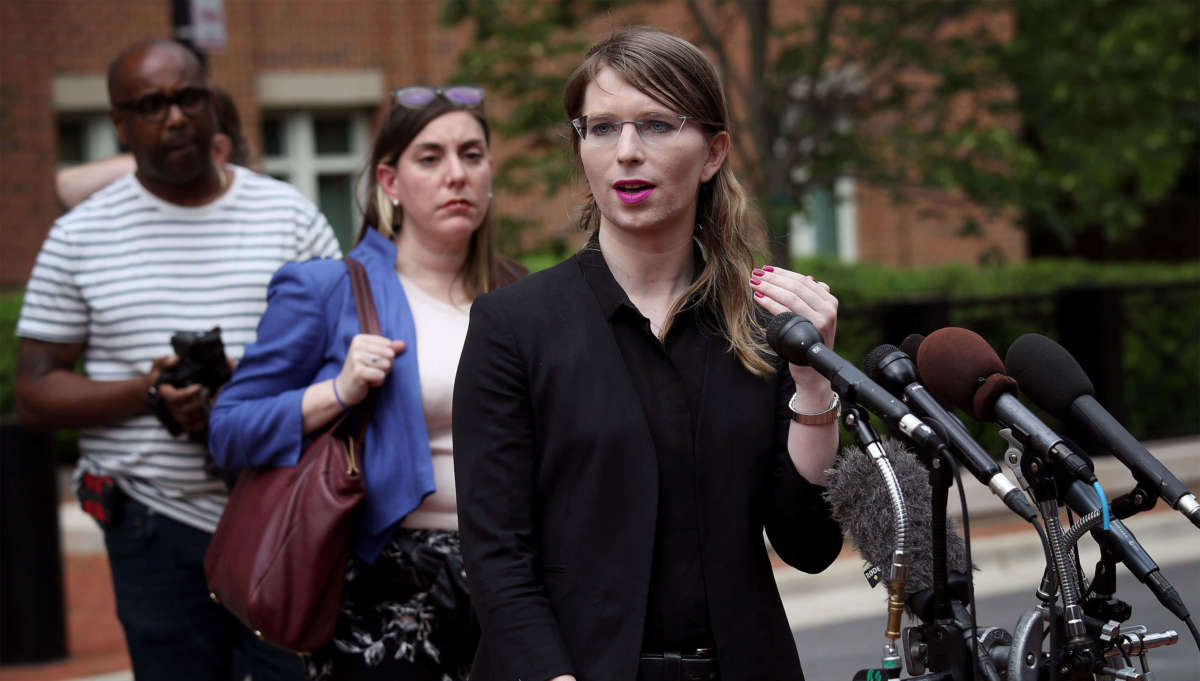United Nations Special Rapporteur on Torture Nils Melzer shared on social media Tuesday a letter he sent to the United States government last month expressing concerns that the continued detention of whistleblower Chelsea Manning amounts to torture.
The Geneva-based expert tweeted in the early hours of Tuesday:
Just out: My official letter to #USGovt of 1 Nov 2019 explaining why continued detention of @xychelsea is not a lawful sanction but an open-ended, progressively severe coercive measure amounting to torture & should be discontinued & abolished without delay https://t.co/uhqKoFSQSq pic.twitter.com/J662CtVAA7
— Nils Melzer (@NilsMelzer) December 31, 2019
Manning, a former U.S. Army soldier, was initially detained in 2010, then convicted under the Espionage Act in 2013, for sending hundreds of thousands of U.S. government and military documents and classified materials to WikiLeaks. In January 2017, outgoing President Barack Obama commuted much of her 35-year sentence, and she was released in May of that year.
Since March 8, 2019—with the exception of a one-week period in May—Manning has been held in contempt of court at the William G. Truesdale Adult Detention Center in Alexandria, Virginia. Manning has been imprisoned—sometimes in solitary confinement—for her refusal to testify to a grand jury about WikiLeaks and its founder, Julian Assange, who is being held in a London prison as the U.S. government seeks his extradition.
Melzer, who also has publicly condemned the U.S. prosecution of Assange and the conditions of his detention, wrote in the letter dated Nov. 1, 2019 that “I express serious concern at the reported use of coercive measures against Ms. Manning, particularly given the history of her previous conviction and ill-treatment in detention.”
Citing his obligations under the Human Rights Council, Melzer included in the letter a list of requests for more information about the detention conditions of Manning—who has made clear she has no intention of testifying, regardless of how long she is held and the massive fines she is racking up. He noted that his message and any response from the U.S. government would be made public within 60 days.
Melzer added:
While awaiting a reply, I recommend that Ms. Manning’s current deprivation of liberty be promptly reviewed in light of the United States’ international human rights obligations. Should my assessment regarding its purely coercive purpose be accurate, I recommend that Ms. Manning be released without further delay, and that any fines disproportionate to the gravity of any offense she may have committed be cancelled or reimbursed.
I intend to publicly express my concerns in the near future as, in my view, the information upon which my concerns are based is sufficiently reliable to indicate a matter warranting prompt attention. I also believe that the wider public should be alerted to the potential human rights implications of these allegations. Any public expression of concern on my part will indicate that I have been in contact with [the U.S. government] to clarify the issue/s in question.
The special rapporteur acknowledged that in 2010 and 2011 his predecessor expressed concerns to the U.S. government about how Manning—who was at that point publicly known as Bradley—was treated in detention.
The U.S.-based digital rights groups Fight for the Future welcomed Melzer’s letter in a statement which pointed out that the special rapporteur’s message “comes as thousands of people have already taken action on a new petition effort at FreeChelsea.com, backed by groups like Fight for the Future, Demand Progress, Freedom of the Press Foundation, Daily Kos, Roots Action, Media Alliance, and Defending Rights, and Dissent.”
The groups plan to deliver the signatures demanding Manning’s immediate release to District Judge Anthony Trenga of the the Eastern District of Virginia next month. Manning, who already has served about nine months in jail, can be held for a total of 18 months.
“The U.S. government’s treatment of Chelsea Manning amounts to a coordinated campaign of harassment and psychological torture,” said Fight for the Future deputy director Evan Greer. “Coercive confinement is widely seen as a violation of human rights. Congress should ban this practice, and Judge Anthony Trenga should release Chelsea immediately, in accordance with international law and basic human decency.”
“If Chelsea is not immediately released, U.S. lawmakers should launch investigations into her ongoing detention,” added Greer. “Individuals who want to support Chelsea should sign the petition and spread the word about FreeChelsea.com.”
